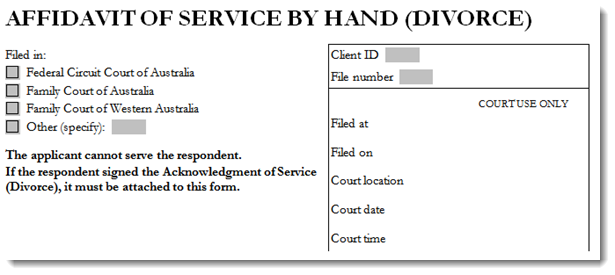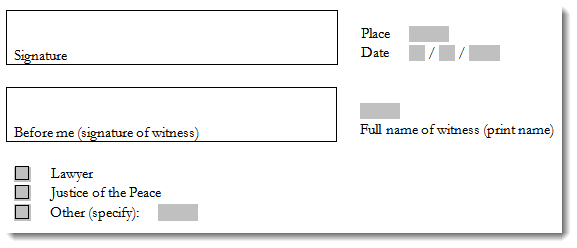
An Affidavit is a document used to record information as evidence for matters being dealt with in Court.
Affidavits are a particular type of document used to record information as evidence for matters being dealt with by a court.
An Affidavit is a document used to record information as evidence for matters being dealt with in Court.
Completed affidavits are filed in a court of law, such as the Family Court, Small Claims Court, Magistrates Court, or the Federal Circuit Court.
The exact court will depend on the type of matter you are dealing with, your particular location and state.
You should use the specific affidavit form provided by the court you are dealing with. You can download the relevant form by navigating to the “forms” page. Refer to the list below.
You will notice that different affidavit forms are available, depending on what the affidavit is being used for, and that different courts have different forms.
You will need to begin your document by completing relevant identifying details, such as the names of the parties, the name and division of the court, the particular registry or location of the court (for example, Sydney, Lismore or Tweed Heads), and the case number.

When you make an affidavit, you will be referred to throughout as the deponent. The word “deponent” is a fancy legal name for the person who is making the affidavit.
Completing the facts
Stick to the relevant facts and be brief as you can. The affidavit should be easy to read and in plain English.
Refer to yourself in the first person throughout the affidavit; that is, use “I”, rather than “the deponent” or your name when setting out what you are wanting to say in the body of the agreement.
Set out the facts in date order for ease of understanding, by a series of numbered sequential paragraphs.
Only state what you know – things that you have seen, heard or experienced directly. You cannot include what others have told you that they have seen or heard. This is referred to as “hearsay” and in most cases, not allowed.
Keep in mind that the information you include in your affidavit will be read by others and become public record. In particular, copies will need to be “served” on the other parties and they will have an opportunity to respond to your affidavit or defend their position.
You can attach documents or other material in support your affidavit as evidence. These attachments are referred to as “annexures” and each should be identified in your affidavit, as “Annexure A”, “Annexure B”, and so on. For example, you could say: “I paid a $5,000 deposit for the motor vehicle on [date], and the receipt I received from ABC Motors is attached, and marked “Annexure A”.”
Choosing to Affirm or Swear
You will notice that you have an option as to whether to affirm or swear an affidavit.
If you believe in a God, you can swear the affidavit is true by your God. You can place your hand on the Bible or other holy book.
Alternatively, you can affirm by solemnly declare the truth of the contents of the affidavit, without any reference to God.
Choose one option and delete the other.

Witnessing your affidavit
Your affidavit must be witnessed by an authorised person, such as a Justice of the Peace or solicitor. Other “authorised persons” will vary depending on your state.
Your witness will need to know that you are the person you say you are, and may ask to sight your Driver’s Licence or other identifying information.
You must sign the document in their presence. The authorised witness will watch you sign the document, and then they will sign it.
You will both need to place your signature at the signing clause at the end of the affidavit, as well as at the bottom of each page and any annexures.

Filing your affidavit
Once your affidavit is completed, signed and witnessed, you can then file it at the relevant court that is handling your matter. You will need to pay a “filing fee,” which will vary according to each court.
Court affidavits and court forms
As Government websites love changing their pages please let us know if any of these links don’t work anymore.
Family Law Court – Apply for divorce
Family Court of Western Australia – kits and forms
Federal Circuit Court – forms and kits
Magistrates Court of Victoria – forms
Magistrates Court of Western Australia – forms
Local Court – New South Wales – forms and fees
Supreme Court of Victoria – forms and fees
Supreme Court of Western Australia – forms and fees
Federal Court of Australia – forms
High Court of Australia – forms
Northern Territory Local Court – forms and fees
Northern Territory Supreme Court – forms
Northern Territory Small Claims Court – forms

